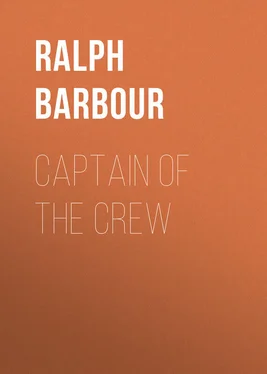Ralph Barbour - Captain of the Crew
Здесь есть возможность читать онлайн «Ralph Barbour - Captain of the Crew» — ознакомительный отрывок электронной книги совершенно бесплатно, а после прочтения отрывка купить полную версию. В некоторых случаях можно слушать аудио, скачать через торрент в формате fb2 и присутствует краткое содержание. ISBN: , Жанр: foreign_prose, foreign_children, на английском языке. Описание произведения, (предисловие) а так же отзывы посетителей доступны на портале библиотеки ЛибКат.
- Название:Captain of the Crew
- Автор:
- Жанр:
- Год:неизвестен
- ISBN:http://www.gutenberg.org/ebooks/48745
- Рейтинг книги:3 / 5. Голосов: 1
-
Избранное:Добавить в избранное
- Отзывы:
-
Ваша оценка:
- 60
- 1
- 2
- 3
- 4
- 5
Captain of the Crew: краткое содержание, описание и аннотация
Предлагаем к чтению аннотацию, описание, краткое содержание или предисловие (зависит от того, что написал сам автор книги «Captain of the Crew»). Если вы не нашли необходимую информацию о книге — напишите в комментариях, мы постараемся отыскать её.
Captain of the Crew — читать онлайн ознакомительный отрывок
Ниже представлен текст книги, разбитый по страницам. Система сохранения места последней прочитанной страницы, позволяет с удобством читать онлайн бесплатно книгу «Captain of the Crew», без необходимости каждый раз заново искать на чём Вы остановились. Поставьте закладку, и сможете в любой момент перейти на страницу, на которой закончили чтение.
Интервал:
Закладка:
The trial heats in several of the events had already been run off, and in the middle of the floor a number of contestants were putting a canvas-covered twelve-pound shot with varying success when Stewart Earle, accompanied by Trevor Nesbitt, left the dressing-room, and pushing their way through the narrow aisles between the rows of chairs, at last reached the former’s father and mother, who, in company with a tall and slender boy of sixteen, occupied seats next to the improvised barrier that divided audience from running track.
“I want you to know Trevor Nesbitt,” said Stewart. “Nesbitt, my mother and father. And that little boy beyond there is Master Carl Gray.” Trevor shook hands with a small, middle-aged gentleman in sober black, who peered upward at him in a manner that suggested near-sightedness, and with a lady somewhat younger than her husband, whose plain but kind face and sweet voice at once won his heart. As Gray was quite beyond reach of his hand, he merely accorded that youth a smiling nod. Stewart was still talking.
“You remember, mother, I told you that Nesbitt was going to run in the two hundred and twenty yards, don’t you? Well, the funny part of it is that we ran a dead heat in the first trial! I guess I’m a goner already.” He ended with a smile that only partly concealed his uneasiness.
His mother smiled from him to Trevor.
“Then you two boys will run together?” she asked.
“Yes, ma’am,” answered Trevor. “There’s five of us left for the final.”
“That’s very nice,” she replied, “for if Stewart is beaten he will not feel so badly if you are the winner, will you, dear?”
Trevor muttered something about there being no danger of his winning, while Stewart answered gaily: “But you’re leaving the other three chaps out of the game, mother; perhaps one of them will beat us both.”
“No fear,” said Carl Gray; “Dunlop’s a stiff, Wharton isn’t in your class, Stew, and as for Milkam, well, I think you can beat him out all right at a hop; so it’s between you and Nesbitt, and may the best man win.”
“That’s right,” said Mr. Earle, nodding his head approvingly. “If your friend is a better runner than you, Stewart, he should win, of course. When do you race?” He held a program up to his eyes and scowled in an endeavor to decipher the lines.
“In about twenty minutes, I guess. Let me see, father.” Stewart took the program. “‘Twenty-yard dash, junior; twenty-yard dash, senior; putting twelve-pound shot; running high jump; one-mile run; pole vault; sixty-yard hurdle; eight-hundred-and-eighty-yard run; two-hundred-and-twenty-yard dash; relay race, one mile, lower middle class versus junior class; relay race, one mile, senior class versus upper middle class.’ Well, you can’t tell by this, I guess; they’ll just pull off the events when they feel like it.”
“All out for the eight hundred and eighty yards,” cried a voice across the building.
“There, see?” said Stewart. “That event’s down after the hurdles; you can’t tell much by the program; you never can. I wish they’d call the two hundred and twenty now, though.”
“Getting nervous, Stew?” asked Carl Gray.
“A little, I guess. There they come for the half mile. Look, there’s Keeler of our class; he’s one of our relay team; isn’t he a peach?”
“A what, dear?” asked his mother.
“A – er – well, I mean isn’t he fine?” stammered Stewart, while Carl and Trevor exchanged grins.
“Is he? He looks from here dreadfully thin,” answered Mrs. Earle.
“That’s partly what makes him a good runner,” explained Stewart. “He’s all muscle, scarcely any weight to carry.”
“Well, dear, I do hope you won’t get to looking like that.”
“Humph, I should hope not.” This from Stewart’s father. The bunch of ten runners had left the mark, and had begun their long series of tours about the track, cheered from the gallery by their fellows. “Go it, Keeler!” shouted Stewart as a youth with ludicrously long legs ambled past, almost the last of the group. A quick glance and a fleeting grin from a queer, good-humored, and very freckled face answered Stewart’s cry, and the runners swept by, their feet pounding loudly as they took the inclines at the turns. The shot putting was over and the victor, a dumpy-looking boy with the lower middle class colors across his shirt, had been clamorously hailed as he walked off with superb dignity, and the vaulting standards were being put in place while a group of half a dozen youths trod gingerly about looking very serious and important. Finally the bar was up, with a white handkerchief across it, and one after another of the contestants, with the long pole in their hands, ran lightly forward, rose till their white-clad bodies swung out from the staff like pennants, and dropped across the bar.
“Why, how easily they do it!” cried Mrs. Earle admiringly, and Stewart’s father clapped his hands vigorously.
“Huh,” said Stewart, “that’s nothing; they haven’t begun yet; just wait until they get that bar up to about nine feet.”
“Nine feet! Why, how high is it now, dear?”
“’Bout seven foot eight, I should think; eh, Carl?”
“There it goes to the even eight,” answered Carl, as the judges raised the bar.
“Is – is there any danger of their falling, Carl,” asked Mrs. Earle.
“Not a bit, and if they do they’ll hit the mattress. I say, Stew, look at Keeler.”
The runners had completed half the distance, and as they again swept by the freckled-faced and long-legged lower middle class boy left his place near the rear of the procession, and with an easy spurt placed himself in the first group. The three boys added their applause to that which thundered down from the far end of the gallery.
“I wouldn’t be surprised if he won,” said Trevor. “He’s running easy and has lots more spurt left, to look at him. But, of course, Manning is a pretty tough proposition, I fancy.”
“Manning isn’t what he cracks himself up to be,” said Carl decidedly. “And I’ll just bet you that Keeler wins out easily.”
A bell clanged warningly, and the tumult in the gallery increased. “Last lap, fellows! Last lap!” “Go it, Freckles!” “Brace up, Manning! Come on, come on!” But Manning couldn’t “come on” to any great extent, and the lower middle boys, leaning perilously over the edge of the gallery, fluttered their colors frantically and shouted incoherent advice, entreaty, and triumph as Keeler, his long legs working like a well-lubricated machine, his freckled face overspread with an easy and confident smile, swept superbly by the exhausted Manning and two other runners and crossed the line, as Carl had predicted, an easy winner.
When the tumult had subsided to some extent the trial heats in the senior twenty-yard dash were begun, the track being diagonally across the floor, and bunch after bunch of white-clad youths raced like the wind toward the tape. The pole vaulting came to an end with a record-breaking accomplishment of nine feet two inches by a member of the upper middle class, and the running high jump began. Then, “All out for the two-twenty, and hurry up!” came the command from somewhere, and Stewart and Trevor struggled through the throng toward the dressing-room to throw aside their wraps.
A minute or two later five boys stood on their marks awaiting the report of the starter’s pistol. Trevor found himself by the side of Dunlop; then came Stewart, Milkam, and Wharton. There was a golden haze of floating dust in the air, and the faces of Stewart’s father and mother and of Carl Gray were indistinct across the building.
“Ready!”
“Get set!”
There was an intense silence about the starting-line, but from above came a deep sound of lowered voices, subdued laughter and the tramping of restless, excited feet.
Читать дальшеИнтервал:
Закладка:
Похожие книги на «Captain of the Crew»
Представляем Вашему вниманию похожие книги на «Captain of the Crew» списком для выбора. Мы отобрали схожую по названию и смыслу литературу в надежде предоставить читателям больше вариантов отыскать новые, интересные, ещё непрочитанные произведения.
Обсуждение, отзывы о книге «Captain of the Crew» и просто собственные мнения читателей. Оставьте ваши комментарии, напишите, что Вы думаете о произведении, его смысле или главных героях. Укажите что конкретно понравилось, а что нет, и почему Вы так считаете.












